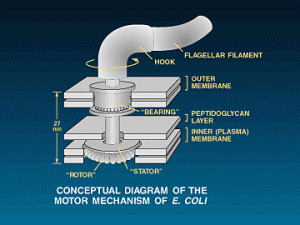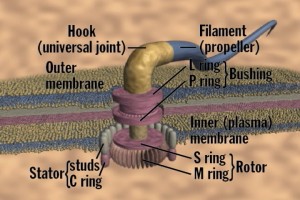In one sense, of course, all Christians believe in an intelligent designer. However, there are different reasons why they hold this belief. Some Christians are sceptical of design arguments, but still believe in God as creator and designer of the universe as part of their Christian faith. It will be clear to readers of this site that we are enthusiastic supporters of design arguments. We’ve argued for design based on the order of the universe expressed in the laws of physics and also for design as the best explanation of the fine-tuning of the universe. More controversially, we’ve argued that the existence of complex life, and especially intelligent life, provides additional evidence for design.
It might seem that all of this – particularly the last point about appealing to design from biology – would mean that we are promoting Intelligent Design (ID), but that would be a mistake. ID is a much more specific version of the design argument which has generated a lot of interest and controversy over the last 25 years or so when it started in the United States. The Discovery Institute explains that:
The theory of intelligent design holds that certain features of the universe and of living things are best explained by an intelligent cause, not an undirected process such as natural selection.
Before we offer some objections to the apologetic value of ID, let us first of all point out that we think there are some really bad criticisms of ID. For example, it’s often just lumped together with Young Earth Creationism, which is certainly incorrect since ID has no commitment to a young Earth, or it’s criticised for trying to use the Bible to do science, which again is definitely a misrepresentation. Claims that it simply appeals to scientific ignorance and is a God-of-the-gaps approach also seem wide of the mark. Also, the suggestion that there is a clear demarcation between science and pseudo-science that enables us to put ID in the latter category is very dubious philosophically.
 Now to our concerns.[i] The first one is a technical point. The main line of argument for ID, particularly in the writings of Michael Behe and William Dembski, is based on an eliminative strategy. First, eliminate chance and necessity as possible explanations, and then infer design as the only alternative.[ii] We think a comparative approach is better.[iii] One advantage of this latter approach is that you don’t have to eliminate the alternatives before inferring design. Now we don’t want to make too much of a technical point (and perhaps ID can be a broad enough church to allow for a comparative approach). However, ID is viewed by its proponents as a rival to the theory of evolution and so the success of ID must come at the expense of evolution. As we argued in our earlier article Debating Darwin we don’t think evolution presents a barrier to design. We presented reasons for thinking that evolution does not remove the need for a designer and that anyone who believes in evolution has good reasons to believe in design. So pitting design against evolution is not necessary, and arguably not desirable, for making the case for design.[iv]
Now to our concerns.[i] The first one is a technical point. The main line of argument for ID, particularly in the writings of Michael Behe and William Dembski, is based on an eliminative strategy. First, eliminate chance and necessity as possible explanations, and then infer design as the only alternative.[ii] We think a comparative approach is better.[iii] One advantage of this latter approach is that you don’t have to eliminate the alternatives before inferring design. Now we don’t want to make too much of a technical point (and perhaps ID can be a broad enough church to allow for a comparative approach). However, ID is viewed by its proponents as a rival to the theory of evolution and so the success of ID must come at the expense of evolution. As we argued in our earlier article Debating Darwin we don’t think evolution presents a barrier to design. We presented reasons for thinking that evolution does not remove the need for a designer and that anyone who believes in evolution has good reasons to believe in design. So pitting design against evolution is not necessary, and arguably not desirable, for making the case for design.[iv]
This leads us to what is perhaps the most important difference between the approach to design we have advocated in previous articles and ID: we have not proposed design as a scientific hypothesis, yet that is precisely what ID is all about. We are not claiming that science must be committed to purely natural explanations, but we do think that design arguments are best understood as part of a broader philosophical discussion, albeit one that draws on scientific evidence. This is what happens with discussions about design in the context of fine-tuning and we don’t see any need to treat design arguments in biology in a different way. Furthermore, we think that design arguments are best understood as part of an overall case for the existence of God and so are happy to identify the designer as God. ID has always been reluctant to do this. No doubt, this reflects our different interests: our interest is in Christian apologetics rather than a new science of design and so we want to talk about God; ID is all about offering a new scientific theory.[v] As an aside, we find it interesting that many of the people we know who are most enthusiastic about ID are interested in it precisely because they want to promote Christian apologetics, not because of any great interest in scientific research.[vi] Yet that seems to us to be getting things the wrong way round if the whole point of ID is to promote a new scientific approach.
And that brings us to our final point. Even Christians who are convinced of the merits of ID as science should be cautious about promoting ID if their goal is to persuade people of the truth of Christianity and we would advise against making it a central part of Christian apologetics. As we argued in our earlier article:
If
a) Scientific materialism cannot explain morality, consciousness, and the existence of an ordered universe and
b) it is possible to provide strong evidence for design without challenging evolution
c) a lot of people who are not Christians accept evolution
d) many Christians accept evolution and
e) it is possible to believe in evolution and accept the Gospel,
then
f) the theory of evolution does not justify scientific materialism and
g) there is no need to make the particular issue of evolution a stumbling block to those who might be interested in Christianity.
 Yet, if too much emphasis is placed on ID, then there is a danger of making this issue an unnecessary stumbling block.[vii] Also, if there is a good case for design from biology that doesn’t require rejecting evolution, as we have argued, that further weakens the case for promoting ID in the context of Christian apologetics. None of this means that Christians should necessarily embrace the view that all of life came about as the result of the neo-Darwinian processes of random mutation and natural selection. However, as we pointed out in our earlier article, there is debate among evolutionary scientists themselves about which processes are dominant in evolution. Furthermore, we don’t see any problem with the idea that God acted directly at various points in the history of life on Earth.[viii] But these issues are distinct from ID and we simply recommend that apologists not make ID an unnecessary stumbling block.
Yet, if too much emphasis is placed on ID, then there is a danger of making this issue an unnecessary stumbling block.[vii] Also, if there is a good case for design from biology that doesn’t require rejecting evolution, as we have argued, that further weakens the case for promoting ID in the context of Christian apologetics. None of this means that Christians should necessarily embrace the view that all of life came about as the result of the neo-Darwinian processes of random mutation and natural selection. However, as we pointed out in our earlier article, there is debate among evolutionary scientists themselves about which processes are dominant in evolution. Furthermore, we don’t see any problem with the idea that God acted directly at various points in the history of life on Earth.[viii] But these issues are distinct from ID and we simply recommend that apologists not make ID an unnecessary stumbling block.
[i] To be fair, there is some controversy over the true definition of Intelligent Design. Bradley Monton, for example, defines the Fine-Tuning and the Kalam Cosmological arguments as Intelligent Design arguments. Seeking God in Science: An Atheist Defends Intelligent Design (Broadview: 2009) p. 39. However, the ID movement’s main proponents concentrate their fire on ‘Darwinian evolution’.
[ii] This approach is found in Michael Behe’s arguments from irreducible complexity (Darwin’s Black Box, Touchstone, 1996) and in William Dembski’s explanatory filter (The Design Inference, Cambridge University Press, 1998).
[iii] For those who are interested, we favour a Bayesian approach. See B. Fitelson, C. Stephens and E. Sober, ‘How Not to Detect Design’, Philosophy of Science, 66 (1999), 472-488 and Timothy McGrew, ‘Toward a Rational Reconstruction of Design Inferences’, Philosophia Christi, 7 (2005), 253-298.
[iv] Here’s how ID proponents might respond. They could argue that they are not ruling out some form of evolution where God guides natural processes, although they are not committed to such a view. What they are ruling out is unguided evolution. So far, so good. We agree with that and have argued that there are good reasons to reject unguided evolution, so what’s the difference between our position and ID? They think that the standard neo-Darwinian approach to evolution is necessarily unguided, but we think that it needn’t be understood that way. While it is true that random mutations, for example, play an important role in the theory of evolution, we cannot conclude that it is therefore unguided. That’s an unwarranted philosophical inference, admittedly one made by many evolutionists, particularly atheistic proponents of it such as Richard Dawkins. Random just means that particular mutations are not caused by a physical mechanism because they are beneficial (see Alvin Plantinga’s discussion in chapter 1 of Where the Conflict Really Lies, Oxford University Press, 2011). It does not follow that it could not have been guided by God. ID proponents might respond that Darwin himself thought of evolution as an unguided process. Yes, but we think he was wrong – surely ID proponents will see that as a possibility! Another objection might be that in principle it could be guided, but that the theory makes such guidance redundant. We disagree with this. We think that the existence of intelligent life would be extremely unlikely given unguided evolution, so if the neo-Darwinian account is correct it doesn’t undermine the need for guidance at all. In other words, it doesn’t explain away the need for design.
[v] Many ID proponents are interested in Christian apologetics too, but that is not part of ID per se.
[vi] This, of course, is not true of the leading proponents of ID who are interested in pursuing ID as science.
[vii] Of course, it is perfectly reasonable for Christian theists to ask if their belief in a God of miracles should alter how they view the evidence for evolution. Some fine Christian minds say yes, some fine Christian minds say no. But this is a debate that is best carried on between believers; not between belief and unbelief. And we worry about the excessive amount of energy – and vitriol – used in this debate.
[viii] See Debating Darwin for some discussion of progressive creation and theistic evolution.
